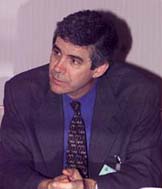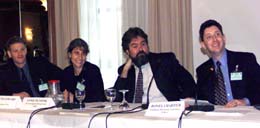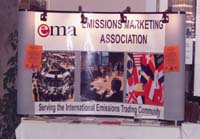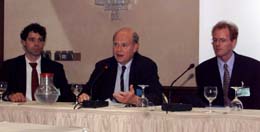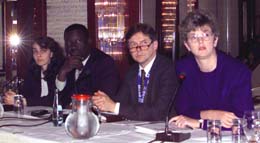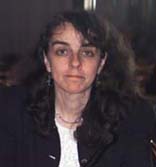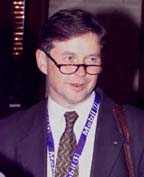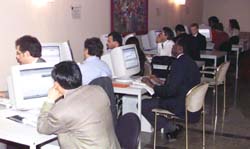|
UNFCCC
Subsidiary Bodies SBI-10 and SBSTA-10 |
||
|
|
|
'COP-5 will be another
'technical' meeting' - Kante Chow reported that progress had been made in a number of areas including Convention Articles 4.8 and 4.9 on adverse impacts, technology transfer, the adoption of new guidelines on inventories of GHGs (an important basis for implementation of the Protocol), a decision on the review of the AIJ pilot phase, and consideration of the Kyoto Mechanisms. Initial
consideration of proposals for Kyoto Mechanisms concludes Voluntary
Commitments: A Third Way? |
| Photos and RealAudio from 10 June | |
|
|
| Chair Espen Ronneberg (second from right) and the delegates from South Africa (G-77/China), US, China, Australia, Canada and Saudi Arabia take a five minute break to confer during the joint working group on compliance. | |
|
|
|
E-mail: nhelme@ccap.org |
|
|
|
| The Emissions Trading Education Initiative, whose members include the EDF and the EMA, premiered the video "Cap and Trade: An Innovation Partnership for a Cleaner Environment". Panel of presenters, from left to right: Garth Edwards (Natsource, Inc.), Annie Petsonk (EDF), Thomas Black (Delegation of Colombia) and Daniel Chartier (EMA). | |
|
E-mail: dan.chartier@wepco.com
|
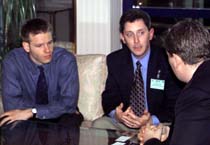 |
| Display mounted by the Emissions Marketing Association. | |
|
|
|
From left
to right: Michel den Elzen, Marcel Berk and Bert Metz (RIVM) presented
a paper which explores several options for burden sharing using
the FAIR model. The Framework to Assess International Regimes
for burden sharing model (FAIR) uses many different criteria for
both participation and burden sharing, in order to support policy
makers in evaluating international burden sharing. |
|
|
|
|
Panel of presenters during "CDM : A Partnership Tool for Business and Industry with Developing Countries - Capacity Building and Creating an Investment Framwork". |
|
 |
|
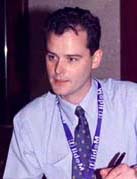 |
|
|
|
|
Peter Doran, ENB, interviews Antoine Bonduelle, Climate Action Network, France. E-mail: racf@wanadoo.fr |
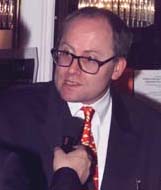 |
| Conference participants at the ever-popular Internet cafe. | |


